News — June–July 2003
Active Transport The Way To Go
The way we move has a significant health impact. Currently it's mostly negative, but it could play a positive role. Active transport, walking and cycling, is the way to go: it will keep people active sustainably, because it becomes part of everyday life. The environments in which we live mostly hinder active transport, but this could change if the health sector played a leading role and worked together with other agencies as well as local government. NSW Health needs to get much more involved in fostering active transport.
This article outlines a study on transport as a determinant of health, with a focus for the potential role for the health sector, authored by Robert Catford, CAMWEST Secretary.
Download Full Study:
Transport as a
Determinant of Health (PDF, 188Kb).
Rides Coming Up
Tizzana Luncheon Ride
Date: Sunday August
31
More Info
Bike Week
21st September
Bay to Mountains Ride
Sunday 21st September
More Info
Sydney to Wollongong Ride
2nd November
Bridges Galore
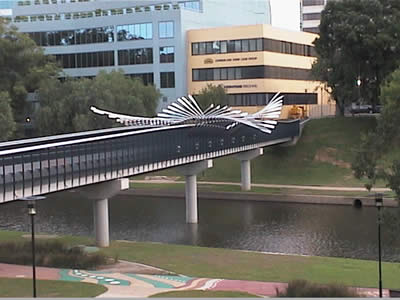 Parramatta Council, Sydney Water, and the RTA 'oar-ed' to be
congratulated for the rebuilding of the Elizabeth Street
bridge, a significant pedestrian and cycling access point
to the Parramatta CBD from the north. The wonderful design
was created by Greg Stonehouse and Susan Milne.
CAMWEST was involved on the Parramatta Cycleways Steering
Committee that lobbied for the new bridge for more than three
years.
Parramatta Council, Sydney Water, and the RTA 'oar-ed' to be
congratulated for the rebuilding of the Elizabeth Street
bridge, a significant pedestrian and cycling access point
to the Parramatta CBD from the north. The wonderful design
was created by Greg Stonehouse and Susan Milne.
CAMWEST was involved on the Parramatta Cycleways Steering
Committee that lobbied for the new bridge for more than three
years.
The bridge is now three metres wide, a marked improvement on the former ugly bridge. Part of the regional cycle route that runs from Epping, the bridge can be accessed at the end of Elizabeth Street on the northern side of Parramatta River.
More bridges are planned. The Parramatta Valley Cycleway (PVC) will be improved by the provision of a wider cantilever structure on the west side of the Gasworks bridge at Macarthur St. Vineyard Creek will soon be crossed by a bridge providing access into the grounds of UWS campus from the east.
Two other bridges are near completion in the South West:
 The first is the new bridge over Prospect Creek at
Carramar. This bridge is being built by Fairfield City
Council for the RTA and will form part of the Fairfield to
Bankstown route.
The first is the new bridge over Prospect Creek at
Carramar. This bridge is being built by Fairfield City
Council for the RTA and will form part of the Fairfield to
Bankstown route.
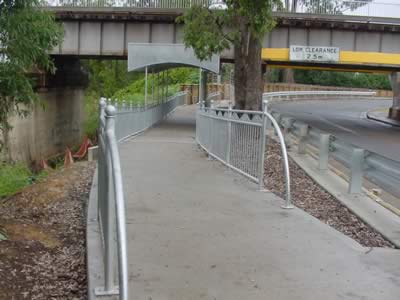 The second photo is of the underpass of the railway line on
Prospect Rd/Moore St at Carramar which again will be
part of the Fairfield to Bankstown Route. This structure is
essentially complete awaiting only its linemarking and
completion of the approach paths. Thanks to Rolf
Lunsmann from the RTA for the photos.
The second photo is of the underpass of the railway line on
Prospect Rd/Moore St at Carramar which again will be
part of the Fairfield to Bankstown Route. This structure is
essentially complete awaiting only its linemarking and
completion of the approach paths. Thanks to Rolf
Lunsmann from the RTA for the photos.
Rouse Hill Ride
Did you miss this year's CAMWEST Rouse Hill ride? Recent rain didn't stop us from having a great time. Make sure you come next year! More Info
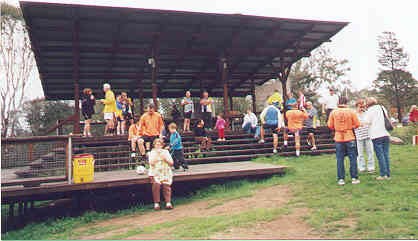
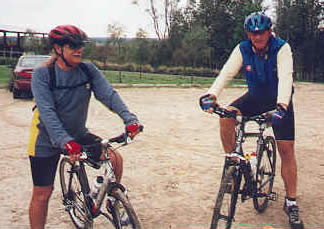
Hunter Valley Ride
A few CAMWEST members enjoyed a great ride in the Hunter. The company was excellent, the friendship was fantastic & the organisation of all activities was superb. Graham reports:
"We rode 70km on the Saturday from Martindale to Denman & then along the Golden Highway to Arrowfield Winery. After wine tasting ordered lunch by phone at Jerry's Plain Tavern (real country size meals with T-bones to big for the plate). The 30km ride back to Martindale went on and on with the last riders arriving in the twilight.
After showers that evening went into the Denman top pub for dinner, another night with of lots of laughter.
Sunday we took it easier & rode 40km out to Rosemount Estate Winery, started out a nice day and by the time we reached Rosemount we had the rain jackets on. Lunch was superbly catered for by Caroline & her sister with the blokes doing the right thing by cooking on the BBQ.
M4 Cycleway
The cycleway is still some way from final completion
mainly cosmetic landscaping. Most of the cycleway is still
classed as a construction zone, albeit a number of the
barricades have been knocked down allowing access. See
Pictures.
Oil Depletion Covered in Conferences
The second conference of the Association for the Study of Peak Oil (ASPO) has been a success, raising awareness internationally of this crucial issue:
Paris Peak Oil
Conference Reveals Deepening Crisis (ASPO)
"May 30, 2003, PARIS – Research presented on May 26th
and 27th at the French Institute for Petroleum (IFP) by a
wide variety of experts from varying and often competitive
perspectives disclosed that, in the year since the first
conference of the Association for the Study of Peak Oil
(ASPO) supply, constraints have worsened and the
realities of energy depletion are becoming more
apparent. A year of violent political history
centered on oil and ever-more unforgiving production results
have begun to force reluctant political and economic
acknowledgement of Peak Oil’s threat to civilization.
Yet ASPO’s founder, Professor Colin Campbell, and his
colleagues, retired TotalFinaElf Exploration Manager, Jean
Laherrère, and Physics Professor, Kjell Aleklett, have
good reason to be pleased with the second-ever ASPO
conference. Hundred and fifty people from more than twenty
countries attended this year, doubling attendance for the
inaugural event held last May in Uppsala, Sweden. In an
acknowledgement of Peak Oil’s penetration of
official consciousness, the event was partially
subsidized by the French Institute for Petroleum, the oil
services firm Schlumberger, and the French oil giant, Total.
The fact that it was held at a government institution was,
according to Campbell, evidence of the fact that Peak
Oil can no longer be completely ignored, even by
politicians".
See Conference
Procedeedings
Meanwhile, the world oil production peak issue has been raised in ABC Radio National's The Business Report, of all places. The quotes below are from a German Scientist at the recent Broome International Hydrogen Conference:
"The car manufacturers I think have understood that they depend to 99% on petrol. That petrol probably will not be as cheaply available in the future as it has been in the past, due to very simple facts. It looks like we go to the maximum of cheap oil production world-wide, and secondly we have a lot of emerging countries like China, India, Indonesia, Latin America; who get motorised, and it's not very likely that they will get motorised on existing cheap available petrol fuel to be made available in a timely manner.
"So those car companies over the last five, six years, have realised that hydrogen can be a way out, and simply due to the fact hydrogen has the maximum feedstock flexibility. You can produce it from fossil sources, but you also can produce it from all renewable sources".
Hydrogen Use Conference Held in Broome (ABC Radio
National - Business Report)
Please note also the very important point that
Hydrogen is an energy carrier, not a source.
The best energy source we have (particularly for transport)
is the cheap to produce oil that is close to peaking.
State governments need to dramatically accelerate the implementation of cycling and rail infrastructure such as NSW's BikePlan 2010 and the Parramatta Rail Link. Federal government should produce a national energy strategy that prepares us for a future with less and less oil. It should also fund cycling and rail, to wean us from our over-dependence on the sticky stuff.
Other ABC shows that have covered this issue are:
Transport
(ABC Earthbeat,12/09/98)
"What I think we have to realise is that the world is
entering a new era in the next century we are sort of leaving
what's called the golden age of oil and we're entering a
period where world oil production is going to peak and world
oil production will then be in decline. And what is going to
happen is the price of oil is going to escalate. There will
be manoeuvering at a political level between countries to
secure oil supplies and it is the potential actual conflict
in the Middle East as this manoeuvering takes place. What is
going to happen is China, being a large country, is going to
come head on in competition with all the other big oil
consumers around the world to try and get their share of oil.
It simply will prove, I believe, just far too expensive and
far too problematic to secure that level of oil just to run
automobiles around cities very wastefully".
Mobile
Metropolis Forum (ABC's Comfort Zone, 1/12/01)
"Car dependence is oil dependence, and when fuel goes up the
value of fringe properties immediately goes down. The onset
of the world peak in oil production, which is now quite
clear, is with us, and increased dependence on Middle Eastern
oil is there. Suburbia therefore has a long-term question
mark over it, and particularly after September 11".
Hydrogen Economy (ABC Radio National Breakfast, 31/10/02)
The Australian Oil industry has already acknowledge Australia's predicament after its own peak in 2000:
"Projections by Australian Government forecasting agencies
indicate that Australia is facing a rapid decline in
liquid petroleum production over the next decade.
Liquids self-sufficiency is expected to decline from an
average of 80-90% over the past decade to less than 40% by
2010.
"The economic implications for Australia are significant
including a rapid deterioration in Australia’s
trade deficit on liquid hydrocarbons (from a surplus
of $1.2 billion in 2000/01 to a projected deficit of $7.6
billion by 2009/10).
"Declining production over the next decade appears
inevitable. However, options to reduce the
longer-term decline are available. These will take time to
implement so urgent action is required.
"During the next ten years the rest of the western
world will also be facing declining indigenous production and
increasing reliance on oil imports, particularly imports from
the Middle East.
"Economies can adapt when the changes to supply are gradual
but the costs from short term disruptions to supply can be
substantial. With increasing reliance on Middle Eastern oil,
the risk of such disruptions will also
increase".
World Oil Markets and the Challenges for Australia - ABARE OUTLOOK (Woodside, PDF, 260Kb)
See our Oil Watch page for more info, including many relevant news articles.
See also a good introduction to the oil production peak analysis.
See our Action Corner for ideas on what you can do.
New CAMWEST Resources
We have produced some advocacy resources to help you push for better bike facilities in your area.
CAMWEST Print Newsletter
We have produced a print newsletter for Autumn, just in time for the state elections. It raises the issue of high petrol prices and the role that cycling can play. This is an excellent way to raise awareness of cycling issues in Western Sydney for people that may not necessarily come to our website. Why not print it out and send a copy to your MP, together with your letter?
Download Newsletter (PDF, 579Kb)
"Forget Healthy. Have Fun!" Poster
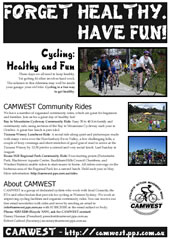 A poster encouraging people to
see cycling as a fun way to get healthy. It's ideal to put up
on your local medical center.
A poster encouraging people to
see cycling as a fun way to get healthy. It's ideal to put up
on your local medical center.
Download Poster (PDF, 553Kb)
CAMWEST Brochure
A one page A4 brochure explaining what CAMWEST does. It includes brief descriptions of our rides and contact details for people to join. You can leave some of these at your local bike shop, library, and shopping center.
Download CAMWEST Brochure (PDF, 544Kb)
Postcard from the Future - Rickshaws Everywhere
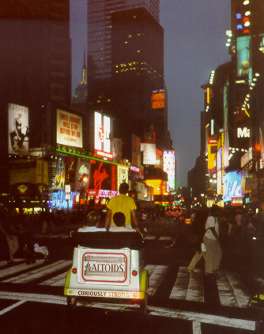
A cycle rickshaw at New York's Times Square, probably the
busiest street corner in the world. Way to go! Rickshaws are
very popular in many Asian countries, and are a cheap, fun
and clean way to get around. We could have Power Assisted ones.
News in Brief
In the Media Lately
Hydrogen Use Conference Held in Broome (ABC Radio National - Business Report)
“The car manufacturers I think have understood that they depend to 99% on petrol. That petrol probably will not be as cheaply available in the future as it has been in the past, due to very simple facts. It looks like we go to the maximum of cheap oil production world-wide, and secondly we have a lot of emerging countries like China, India, Indonesia, Latin America; who get motorised, and it's not very likely that they will get motorised on existing cheap available petrol fuel to be made available in a timely manner.“So those car companies over the last five, six years, have realised that hydrogen can be a way out, and simply due to the fact hydrogen has the maximum feedstock flexibility. You can produce it from fossil sources, but you also can produce it from all renewable sources”.
The May edition of the ASPO Newsletter (on oil depletion) is out now.
Blueprint
gives coalition control of oil (The Guardian,
10.5.03)
US and Britain see advisory role for UN in draft
resolution.
Bush
plan to exploit Alaskan oil thwarted (The Guardian,
21.3.03)
"Just as the war was starting in Iraq, President Bush lost a
different kind of battle in the senate as his plans for
drilling for oil in the Arctic National Wildlife Refuge in
Alaska were defeated".
Extinction of the car giants (The Economist, 12/6/03)
Miniature fuel cells - Batteries not included? (The Economist, 15.5.03)
Big oil's dirty secrets (The Economist, 8.5.03)
Saddam Deserves Some Carbon Credits, by Belinda Keir
(Perspective - ABC Radio National, 10/4/2003)
"What would really hit the oil companies (and make a
difference to the greenhouse effect) would be if we bought
less petrol. Why donít the emails say ìuse 20% less
petrol this week by catching the train on Tuesdayî or
ìcommuter massed bike ride along Parramatta roadî?
It is because my friends see car use as a right, not a
wrong".
Children getting fat younger (SMH, 19.5.03)
Breakfast epiphany (SMH, 19.5.03)
"One in six school children say they have eaten no fruit or
vegetables in a three-day period, according to alarming
research that raises new questions about the quality of
children's diet".
Make that 50: brakes on the burbs SMH (8.5.03)
Six
in 10 overweight and the box is to blame (SMH,
5.5.03)
"Obesity in Australia has more than doubled in 20 years,
causing alarm among scientists and doctors who fear that its
consequences - heart disease, diabetes, high blood pressure
and cancer - will become even bigger scourges". CAMWEST would
like to see children being able to cycle to school once
again. For this we will need support from government, safe
cycleways which link families to schools, and promotion.
Great ideas such as the Walking and Cycling Bus can start to
address this problem.
Out
with enclaves and in with villages: keeping crooks at bay
(SMH, 5.5.03)
"The law and order debate should focus on urban design,
writes Mark Latham".
The world's angriest drivers (SMH, 30.4.03)
"Australian drivers are among the most abusive and aggressive
in the world, a survey on road rage has found". They should
try cycling for a bit of relaxation! In some European
countries, the 'weaker' mode of transport is protected from
the bigger. For example, in an accident between a car and a
bicycle, the car driver is assumed to be 'at fault', and the
burden is on them to otherwise. Naturally, the same could
apply between a truck and a car, or a bicycle and a
pedestrian.
CAMWEST Needs You
We need more members to achieve better bike facilities in Western Sydney. Lately some members have become less involved because of personal circumstances. At the same time, there's a number of projects we'd like to get involved in. Join us and make a difference.
Action Corner!
Make a submission to the Ministerial Inquiry into
Public
Passenger Transport (email inquiry@transport.nsw.gov.au).
More
Info. You could raise concerns over Australia's oil
production situation, and aks for much better integration
between cycling and public transport.
See a sample submission. It's always a good idea to edit it into your own words.
CAMWEST's Action Corner is where we include one or two suggestions of something simple and concrete that you can do: write an email, letter, representation, turn up for a ride, etc. Join us in making a difference!
Get in touch
Would you like to get these news via email every two months? Join our mailing list.
For information on who we are and contact details, click About Us. For feedback on this site or telling us news you want mentioned here, please email cycling (AT) camwest.org.au.
